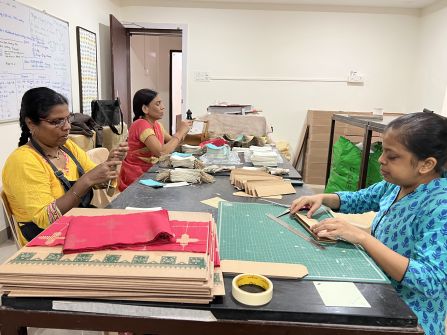Meet the Circular Economy Leaders: Go Do Good Studio
| Date |
Date
|
| Subject |
Subject
Circular economy
|

We, at Circular Economy Catalyst, are thrilled to present “Circular Economy Leaders” - a brand-new articles series to feature some of the most exciting circular enterprises and let them share about their unique vision, approach and stories.
Today we are taking a closer look at the Go Do Good Studio from India, which offers innovative, 100% home-compostable packaging solutions made from seaweed. We had a chance to take a deeper look into what makes them special together with Khushboo Gandhi, Go Do Good Studio Co-Founder and Creative Director.
Implementing the Circular Vision
Go Do Good Studio entered the market in India with a clear vision and an objective to replace single-use plastic packaging with natural materials. Khushboo Gandhi states, “Single-use plastic abuse has been creating massive environmental damage over the past decade which has affected both land and marine lives. Hence, it is very critical to come with an alternate market which provides the same functional requirements needed in the packaging space with the use of natural and biodegradable materials.”
Alongside using natural materials, Go Do Good Studio is dedicated to refurbishing and reusing the existing materials, which makes them an even more flexible and adaptable circular enterprise.
As any innovative enterprise, Go Do Good Studio faces fierce completion from more traditional businesses, which motivates them to innovate even more. “In order to make the business circular, the key challenges faced involve setting up processes and using materials that work in a circular manner. Hence, constant product as well as process innovations become key action steps in the entire enterprise”, shared Khushboo Gandhi.
Luckily, circular economy approach aligns perfectly with their business, as Go DoGood Studio is striving to optimise natural resources and recover waste by giving it a second life as a new product.
The Future is Bright
Go Do Good Studio is on the mission to potentially eradicate plastic packaging by offering alternative packaging from natural materials. On the rode to this ambitious goal they have already developed 5 market-ready materials and 3 more in the pipeline which are completely biodegradable and home-compostable while still having the same qualities as that of plastic.
“Our goal for the next 5 years is to make consumers and brands more aware of our products and their importance in the packaging industry to create a parallel market at par with the strength of the plastic industry. This would also require us to scale up our production operations to be able to supply larger quantities which would help us in catering to larger corporates and industries from various sectors like FMCG, F&B, E-Commerce etc.”, claims Khushboo Gandhi.
Moreover, the enterprise’s team envisions massive growth in the coming years, as they will need to expand their staff and simultaneously provide growth opportunities for the current employees.
Supporting Circular SMEs is Crucial
Khushboo Gandhi believes that the growth rate of circular SMEs in India is rapid, as exemplified by Go Do Good, because numerous individuals and teams in the country are dedicated to solving the modern environmental issues. However, he thinks that despite having an innate ability to come up with innovative solutions, they sometimes struggle to convert them into market competitive products, which is where circular enterprises may need help.
“When it comes to receiving support, we would love to get more in-depth and thorough knowledge in creating profitable businesses out of materials that work in a circular manner. This along with getting access to more grants and market linkages to help scale up the business is something that the whole SME community would truly appreciate”, says Khushboo Gandhi.
Through collaboration with adelphi’s Circular Economy Catalyst, Go Do Good Studio has been able to structure their business in a refined manner and established systems which will help them scale up.
Khushboo Gandhi believes that the most valuable topics from CEC workshops for the enterprise has been the identification of the key stakeholders and the interlinkages amongst them, as well as the solution prototyping tool, which has proven to be helpful in narrowing down on the key problems for a startup and coming up with viable solutions.
“Impact first Circular startups like ours have been born as a result of a keen interest and desire to bring about change in the existing systems which are harming the social, economic and environmental harmony of the society. By supporting SMEs like ours, organizations like adelphi help these startups become ready to face the world with a market competitive business model and products. The financial support provided would definitely help us scale up to reach the next level whether it comes to team building, increasing market reach and/or increasing production capacity” concludes Khushboo Gandhi.
